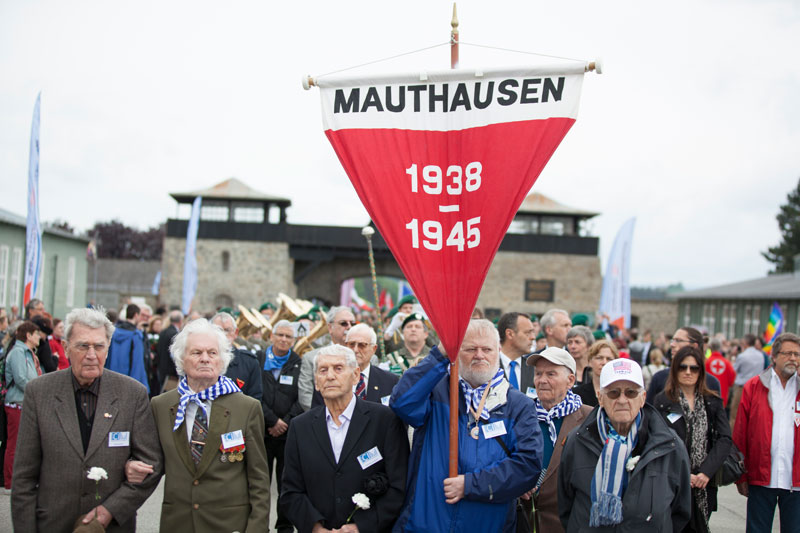
Survivors leading today's march of remembrance. About 20,000 people attended in total, including Austria's acting president, the Chancellor and the President of Parliament.
About the camp:
The Mauthausen-Gusen camp was one of the first massive concentration camp complexes in Nazi Germany, and the last to be liberated by the Allies. The two main camps, Mauthausen and Gusen I, were labelled as "Grade III" (Stufe III) camps, which meant that they were intended to be the toughest camps for the "Incorrigible political enemies of the Reich". Mauthausen never lost this Stufe III classification. In the offices of the RSHA (Reichssicherheitshauptamt) it was referred to by the nickname Knochenmühle the bone-grinder (literally bone-mill).
The death toll remains unknown, although most sources place it between 122,766 and 320,000 for the entire complex. [from wikipedia]
The camp had a gas chamber, but most of the inmates were killed through the living and working conditions in the camp - first and foremost by labor in the nearby stone quarry. Many of them fell down the so called "Todesstiege" (stairs of death), a steep and narrow path leading from the camp down into the quarry. It resembled nothing like stairs, just irregular "steps" hacked into the rock, sometimes 1 foot high, sometimes 5. The "workers", exhausted from labor and their "living" conditions regularly fell to their death (and took others with them) as they had to carry rocks up those "stairs".
The top of the stairs was called the "Fallschirmspringerfelsen", or "Parachutist's rock" in englisch. Prisoners had to line up at the ledge and were left with the decision to either jump or get shot.
A survivor's account of the last days:
I do not know how I or anybody else survived the train trip as we seldom if ever had anything to eat. I have only a very vague recollection about the journey. The only thing I remember that from time to time the train stopped in the middle of nowhere, we were let out, to throw down the dead bodies. I definitely remember looking for charcoal, as everybody had diarrhea and that was the only "medicine" available. Finally, we walked from Mauthausen train station to the camp, on the top of the mountain.
My spirit rose, when the Hungarian speaking SS --from our old camp-- came alongside me and said. "It will be all right now for you, the war will not last longer than a few days, but what will happen to me?" I did not dare to tell him, what I thought, that he deserved what he will get [or is he today a wealthy businessman in Germany?]
In the camp, it was the usual procedure, never mind that the war was close to the end. Shower, delousing, back to the same dirty uniform, march down to the so called "Russenlager" a section of the camp, which earlier housed Russian POWs, but now was the place to collect deportees to die from "natural causes". Within days the SS disappeared, and the camp was taken over by Viennese police. On the 5th of May, 1945, the Americans arrived, not believing what they saw.
There were rotting bodies everywhere, and for days the Americans wandered around, filming the scenes from Dante's inferno. They forced the town folk to see the camp, then to dig mass graves, where German soldiers and locals had to bury the victims with their bare hands.
The Americans wanted to be helpful, so they gave us food. Lots of people died in the next weeks from over-eating. People who were feeble, sick, hungry, ate the --rich and plentiful food and died. Laci Kantor, who days ago had kissed me, and thanked God that he had survived, that he was free to go home to his parents, laid in our bed next morning, dead by my side.
Slowly the Americans realized the situation and erected tents for hospitals and took the sick there. Every hour a little bus arrived, picking up 12 people, who were laid out in front of our barrack, waiting for the transport to the hospital. My instinct for life gave me strength to crawl out on my own accord, and lay beside them. The hospital bus came, there were 13 people. What could they do? They took 12, and would come back for the 13th an hour later. I was among the 12. Who knows, maybe this hour made the difference between life and death. I knew I had to do it.
http://isurvived.org/Survivors_Folder/Stephen_Casey-hungarian.html
I visited the former camp, now memorial, a couple of years ago. I shared some of my pics with gaf already, but here's a repost:

The former camp as you approach it today



The "Bunker" - if the Nazis thought you had something to tell them, or simply didn't like you, they put you in here. In between severe beating-session.

Gallows

Gas Chamber

Stairs of Death

Today it's a nice stair, located outside of the memorial (there were people jogging there when I visited...). Back then it was an uneven pile of rocks almost impossible to climb without tripping - even without the heavy load the prisoners were forced to carry.

Parachutist's Rock
